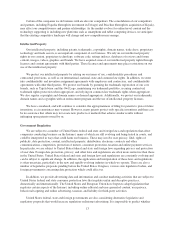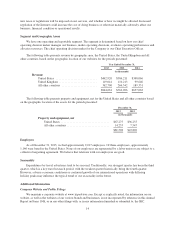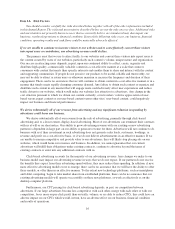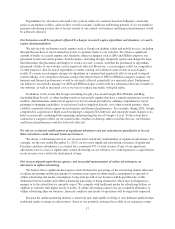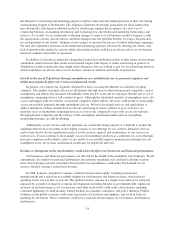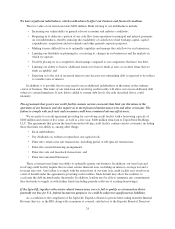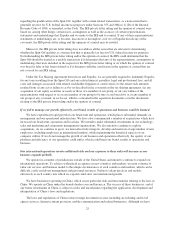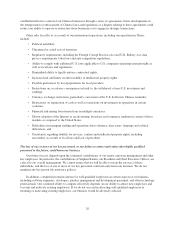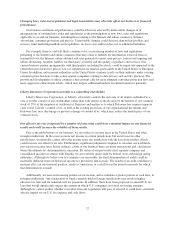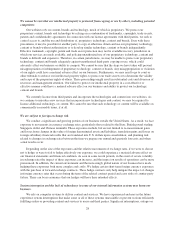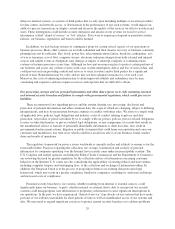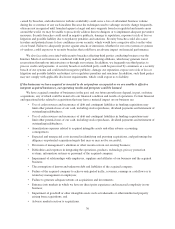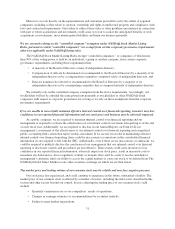TripAdvisor 2013 Annual Report Download - page 31
Download and view the complete annual report
Please find page 31 of the 2013 TripAdvisor annual report below. You can navigate through the pages in the report by either clicking on the pages listed below, or by using the keyword search tool below to find specific information within the annual report.was deemed by users or the media to be inaccurate or fraudulent, our brand, business and reputation could be
harmed. Any damage to our reputation could harm our ability to attract and retain users, employees and
advertisers, which would adversely affect our business and financial performance. In addition, significant adverse
news reports or media, industry or consumer coverage of us would reflect poorly on our brands and could have
an adverse effect on our business and financial performance.
We are dependent upon the quality of traffic in our network to provide value to online advertisers, and any
failure in our quality control could have a material adverse effect on the value of our websites to our
advertisers and adversely affect our revenue.
We use technology and processes to monitor the quality of and to identify any anomalous metrics associated
with, the Internet traffic that we deliver to online advertisers. These metrics may be indicative of low quality
clicks such as non-human processes, including robots, spiders or other software; the mechanical automation of
clicking; and other types of invalid clicks or click fraud. Even with such monitoring in place, there is a risk that a
certain amount of low-quality traffic, or traffic that online advertisers deem to be invalid, will be delivered to
such online advertisers. As a result, we may be required to credit amounts owed to us by our advertisers.
Furthermore, low-quality or invalid traffic may be detrimental to our relationships with advertisers, and could
adversely affect our advertising pricing and revenue.
We rely on assumptions and estimates and data from third parties to calculate certain of our key metrics, and
real or perceived inaccuracies in such metrics may harm our reputation and negatively affect our business.
Certain key metrics, such as the number of our active users, unique visitors, total traffic and number of
reviews and opinions, are calculated, in some cases, using internal company data and, in other cases, relying on
data from third parties. While these numbers are based on what we believe to be reasonable calculations for the
applicable periods of measurement, there are inherent challenges in measuring usage and user engagement across
our large user base around the world. For example, a single person or user may have multiple accounts or browse
the internet on multiple browsers, some mobile applications automatically contact our servers for regular updates
with no user action and we are not able to capture user information on all of our platforms. As such, the
calculations of our active users and unique visitors may not accurately reflect the number of people actually
using our platforms. In addition, our measures of user growth and user engagement may differ from estimates
published by third parties or from similar metrics of our competitors due to differences in methodologies utilized
by us and the third parties for which we rely on this data.
We are continually seeking to improve our ability to estimate these key metrics. We regularly review and
adjust our processes for calculating our internal metrics to improve their accuracy. If our users, advertisers,
partners and shareholders do not perceive our metrics to be accurate representations or if we discover material
inaccuracies in our user metrics, our reputation may be harmed. In which case, users may not use our products
and services and advertisers and partners may be less willing to allocate their budgets to our products and
services which could negatively affect our business and operating results.
We rely on information technology to operate our business and maintain competitiveness, and any failure to
adapt to technological developments or industry trends could harm our businesses.
We depend on the use of sophisticated information technologies and systems. As our operations grow in size
and scope, we must continuously improve and upgrade our systems and infrastructure while maintaining or
improving the reliability and integrity of our systems and infrastructure. Our future success also depends on our
ability to adapt our services and infrastructure to meet rapidly evolving consumer trends and demands while
continuing to improve the performance, features and reliability of our services in response to competitive service
and product offerings. The emergence of alternative platforms such as smartphone and tablet computing devices
and the emergence of niche competitors who may be able to optimize products, services or strategies for such
platforms will require new investment in technology. New developments in other areas, such as cloud computing,
21




